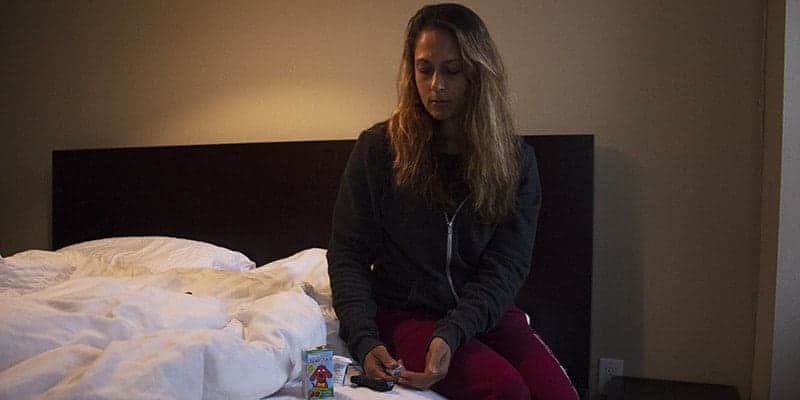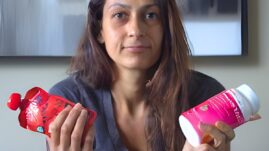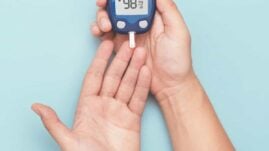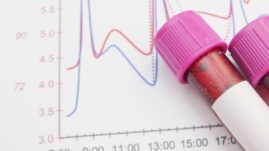This post may contain affiliate links. Please read our disclosure.
Having low blood sugar at night is the worst. THE WORST! If you are treating your diabetes with insulin, you know what I’m talking about.
That feeling when you wake up in the middle of the night soaked in sweat and shaking due to low blood sugar.
Your whole body goes into stress mode, and all you can think about is EATING! I absolutely hate it, so I wanted to share my approach on how to treat low blood sugar at night with you guys.

So, how do I treat low blood sugar at night?
What I do is treat it for what it is, a medical emergency. So I test my blood sugar and immediately eat or drink 8-15 grams of carbs in the form of 2 glucose tablets or 125 ml juice.
I then assess whether I need a low-glycemic carb as well. The assessment only involves checking that I didn’t bolus within the last 4 hours. If I did, I might have to cover that with a few rice cakes.
The reason why I say 4 hours is because I bolus with Humalog, which stays active in the body for about 4 hours. If it has been more than 4 hours since I took my bolus, I know that just the sugar or juice will get me through the night.
My recommendation is to be honest with yourself, and if you can’t go into the kitchen and just have those 15 grams of carbs without emptying the fridge every time, then keep your emergency carbs in the bedroom next to your bed (that’s always a good idea anyway).
I also recommend that you don’t treat your hypoglycemia with candy or cake. As I said, it’s a medical emergency and you need a carb that will hit your bloodstream quickly.
Pure sugar or juice is the best for that because the fat in candy or cake will slow down carb absorption. Also, you don’t need a treat in the middle of a low blood sugar. You’re not enjoying it anyway, just stuffing your face.
You can read more about the best and quickest ways to treat low in this post: How to Treat Lows as Quickly as Possible
How to prevent low blood sugar in the future
There is probably no way to completely eliminate low blood sugars at night, but I have learned how to limit them quite a bit.
What I do is pretty simple — I try to learn from my mistakes. If I have a low during the night, I’ll go back and see how my insulin patterns were the day before, what I ate, and what I did.
For example, my last low blood sugar was at 4 am a few nights ago, and when I went back and analyzed the data, this is what I found:
Since it was 4 am and my last snack was at 11 pm, the low couldn’t be due to my last bolus. I also hadn’t changed my basal amount. However, I had moved my workout to later in the evening.
So my conclusion was that to limit future nighttime lows, I should take less basal insulin before I go to bed if I work out later in the evening. That’s a pretty easy fix. I reduced my nightly basal and now I’m sleeping through the night again and waking up with perfect sugars.
For more in-depth tips on how to prevent low blood sugar at night, watch this video where I share exactly what I do:
Do my tactics work every time?
No, I still have nights where I go low and nights where I overeat to treat it, but they are really few and far between.
I’m not perfect, but always analyzing why I had a low and making adjustments going forward has helped a lot in reducing my nighttime lows.
And having the right food and drink easily available has helped me treat my lows in the right way.
I hope this can help some of you and I would love to hear your advice and tricks as well. If you have a smart way of dealing with nighttime lows, please write it in the comments so everyone can learn from it.




Lori Izeman
I just ilove your information! I have 2 different questions. Do glucose tablets expire? And why is it taking longer for my Humalog to work for meals? I bolused 8 units and after 3 hours my glucose never went down so I didn’t eat. So I took 8 more in a different body part. Another few hours and it’s finally dropping to a normal range. I’m so hungry!
Christel Oerum, MS
All perishable products have an expiration date.
It could be that your long-acting insulin isn’t titrated correctly, and your Humalog isn’t enough in itself. It might be time to discuss your dose with your medical team.
Dion Fowles
Just having a low right now. 2.8 mmol, so shaky and foggy head. Just took my three jelly beans which normally sees me right. Interesting is that some nights my levels drop like a stone.
I focus primarily on healthy eating, mostly Plant-Strong, but this weekend my sugars have been unusually high like the injections have not worked, and then tonight it is like I get a flood of insulin. Does anyone else experience this.
Christel Oerum
A few common reasons for those inconsistent highs can be insulin gone bad or not being as potent any more, lack of sleep, dehydration, stress or an infection. I think most of us have those days, it’s tough, but we just have to power through
Kathleen Chaconas
Another thing to check if you’re MDI… Check that the needle is straight before injecting and then again afterward.
I have learned that if the needle cap didn’t go on straight at first , the needle inside may have bent … and then nothing, or not all, comes out.